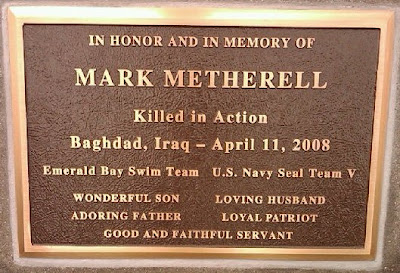
Remembering my best friend and others that have given so much on Memorial Day. It's the least we can do.
The images are of my friend's family (his wife and parents) and the plaque they installed at the commissioning of it all in Emerald Bay, CA. It's also of his daughter both on his fresh grave and this year. . .the images shows what he's missing for all of us.


I didn't think I'd have a lot to add to Mr. Helprin's essay, so I'm reposting:

On Memorial Day
Mark Helprin
In American military cemeteries all over the world, seemingly endless rows of whitened grave markers stand largely unvisited and in silence. The gardeners tend the lawns, one section at a time. Even at the famous sites, tourism is inconstant. Sunsets and dawns, winter nights, softly falling snow, and gorgeous summer mornings mainly find the graves and those who lie within them protected in eternal tranquility. Now and then a visitor linked by love, blood, or both will come to make that connection with the dead that only love can sustain. Sometimes you see them, quiet in some neglected corner beneath the trees or on a field above the sea, but numbers and time make this the exception. If not completely forgotten, the vast ranks of Civil War dead are now primarily the object of genealogy and historians, as the fathers and mothers, women, children, and brothers who loved them are now long gone. As it is for everyone else it is for the dead of all the wars, and neither proclamations nor holidays nor children innocently placing flags can cure it.
Nonetheless, a universal connection links every living American with those who have fallen or will fall in American wars and overrides the lapses in sustaining and honoring their memories. We are and shall be connected to them by debt and obligation. Though if by and large we ignore the debt we owe to those who fell at Saratoga, Antietam, the Marne, the Pointe du Hoc, and a thousand other places and more, our lives and everything we value are the ledger in which it is indelibly recorded. And even if we fail in the obligation, it is clear and it remains. What do we owe soldiers on the battlefields of the present or--do not doubt it--the future? How does one honor the inexpressibly difficult decision to walk toward annihilation, in some instances guaranteed, for the sake of the imperfect strategies of war, their confused execution, and their uncertain result? What can we offer the soldiers who will not know the outcome of their struggle, or ever again see those left behind?
We owe them a decision to go to war ratified unambiguously by the American people through their constitutional and republican institutions. Except where instantaneous response is necessitated by a clear and present danger, this means a declaration of war issued by a Congress that will fully support its own carefully determined decision and those it sends to carry it out--nothing less, nothing hedged, nothing ducked.
This requires in turn the kind of extraordinary, penetrating debate that can occur only among those wise enough to understand mortality and weigh it against principles that cannot be left undefended. It requires a president who can argue for his decision not merely with eloquence but substantively and tenaciously--guided only by the long-term interests of the United States, not fatuous slogans, political imperatives, and easily impeachable ideological notions of the right, left, or center.
Look ahead, not back. If we commit soldiers to battle, we must support them unstintingly. There are many ways to pay for war: taxing, borrowing, cutting other expenditures, sharing the burden with allies, adjusting war aims, and starving the means to fight. The only unacceptable one is the last. If the general population must do with less, so be it, for the problem is only imagined. Better than feckless politicians who think it lives by bread alone, the American people has always known that its enlisted sacrifices are hardly commensurate with those of the maimed and the dead.
A soldier's destiny must rest, rather than with careerists, in the hands of grave and responsible officials and commanders, those who experience what Churchill called the statesman's "stress of soul." He should never have to die for the sake of an academic theory once the doctoral thesis of an Ivy League idealist working his way up through the bureaucracies and think tanks.
And yet the commander who does not labor to educate himself unceasingly is likely no better than his opposite number in the seminar room. Above all, he must have a genius for war, an inherent quality that cannot be manufactured and is usually crowded out by that part of the brain that makes for a brilliant career, and punished by the higher ranks for having what they do not. Such people deserve the protection and promotion that mostly they do not receive, for when they do they become Grant, Churchill, Marshall, Eisenhower, and Patton.
The debt we owe, and in regard to which we are at present deeply in arrears, may be difficult to pay but it is easy to see. To grasp its conspicuous clarity one need only walk among the graves and pause to give proper thought to even just one life among the many. Read slowly the name, the dates, the place where everything came to an end.
I have seen lonely people of advancing age, yet as constant as angels, keeping faith to those they loved who fell in wars that current generations, not having known them, cannot even forget. The sight of them moving hesitantly among the tablets and crosses is enough to break your heart. Let that break be the father to a profound resolution to fulfill our obligation to the endless chain of the mourning and the dead. Shall we not sacrifice where required? Shall we not prove more responsible, courageous, honest, and assiduous? Shall we not illuminate our decisions with the light that comes from the stress of soul, and ever keep faith with the fallen by embracing the soldiers who fight in our name? The answer must be that we shall.















